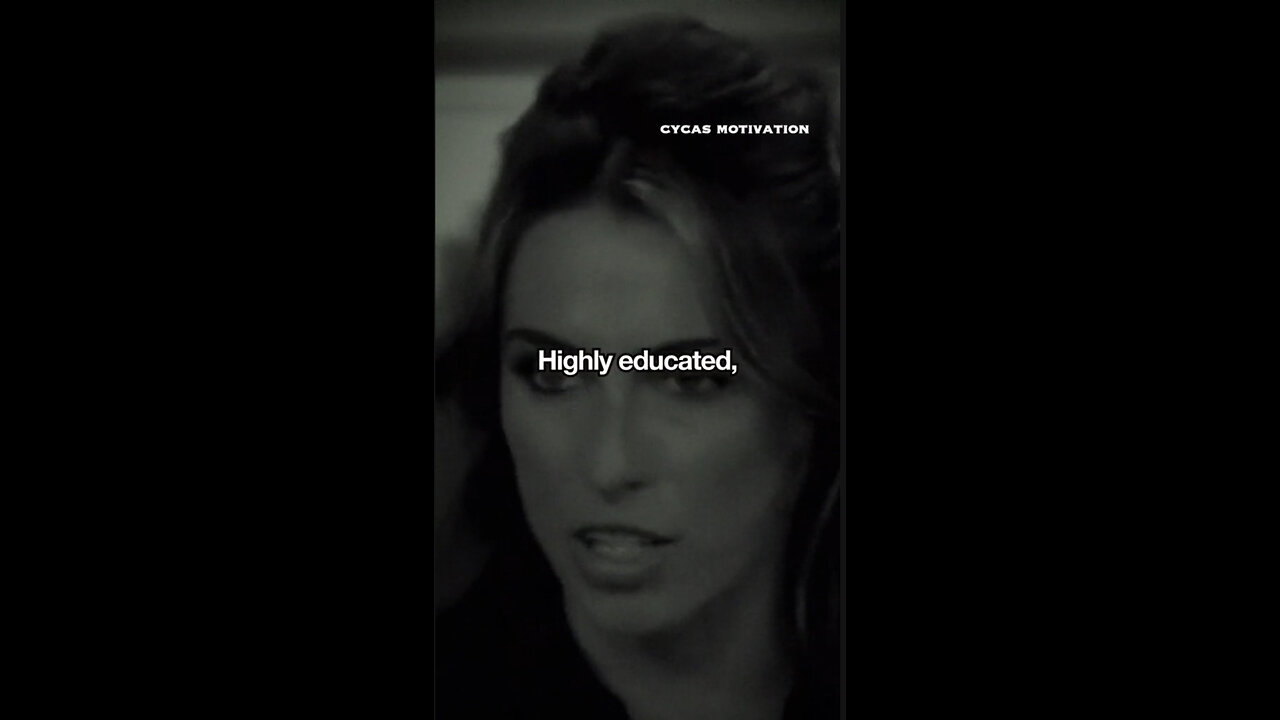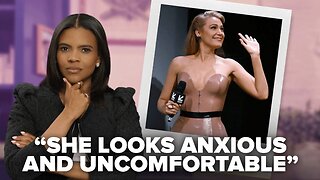Premium Only Content

Understanding the Expectations in Modern Dating: Insights into Gender Dynamics
In the modern dating landscape, many women, particularly those who are highly accomplished, educated, and confident, find themselves facing an unexpected challenge: the dating pool seems increasingly unresponsive or even dismissive of their achievements. This leads to an important question: What are men really looking for in relationships, and why do some seem hesitant to pursue accomplished women?
On the surface, this dilemma appears puzzling. Why wouldn’t men want to date women who are intelligent, successful, and well-rounded? Shouldn’t those qualities be appealing? The truth, however, is more complex, rooted in a mix of social conditioning, psychological factors, and shifting gender dynamics.
The Myth of Unrealistic Expectations
Many women express frustration over the seemingly unrealistic expectations that some men bring to dating. They see highly accomplished, successful women being overlooked, despite possessing qualities that, on paper, should make them highly desirable. This raises the question: What are men really expecting from relationships, and why are these qualities sometimes perceived as a barrier?
The reality is that men’s expectations aren’t necessarily unrealistic, but they are often shaped by traditional gender roles and perceptions of family dynamics that still hold significant weight. For some men, the idea of dating a highly accomplished woman can evoke feelings of inadequacy, competition, or insecurity—particularly if they have been conditioned to see themselves as the primary providers or protectors in a relationship. While this isn’t true for all men, it reflects a broader societal pattern where the balance of power and traditional gender roles still influence relationship dynamics.
The Shift in Gender Roles and Its Impact
Historically, men were often viewed as the primary breadwinners, and women as the nurturers, roles that defined their status and value in relationships. However, with the rise of educational opportunities, career advancements, and greater autonomy for women, these dynamics have shifted significantly. Many women today are achieving unprecedented levels of success, often surpassing their male counterparts in education and career achievements.
This shift in gender roles has created an identity crisis for some men, particularly those who still equate masculinity with being the provider or holding more traditional roles within a relationship. The idea of being with a woman who is equally or more accomplished can feel like a challenge to those deeply ingrained beliefs. Rather than being attracted to these qualities, some men may feel intimidated or inadequate—fearing that they will not meet the woman’s expectations or that the relationship dynamic will feel imbalanced in ways they are not comfortable with.
Why Are Men Avoiding Accomplished Women?
One common argument suggests that highly educated, successful women may come across as demanding or entitled, and therefore, some men shy away from dating them. The idea here is that these women, because of their success, are perceived as having high standards that may make the relationship more challenging, or that they will expect equality in all things, which could disrupt traditional relationship structures.
This argument, however, is overly simplistic and often grounded in stereotypical assumptions. While it is true that some accomplished women may have clear standards for relationships, this does not inherently make them difficult or demanding. In fact, many accomplished women seek partnerships based on mutual respect, collaboration, and shared growth. However, these expectations may conflict with men who feel that relationships should conform to more traditional roles where men are dominant decision-makers.
In many cases, the discomfort stems not from the woman’s success, but from a misalignment of expectations. Men who expect to take on the role of provider or who associate success with authority may struggle with the idea of sharing power or decision-making in the relationship. This internal conflict, whether consciously recognized or not, can lead to avoidance or hesitation when it comes to pursuing highly successful women.
The Fear of Losing Control
For many men, relationships are still tied to concepts of power and control. Dating a woman who is confident, successful, and capable in her own right may feel threatening to those who are accustomed to holding more traditional power dynamics in relationships. The fear of losing control or having to adjust their role within the partnership can be a significant deterrent.
This fear isn’t just about losing control over decision-making or finances—it’s also about a deeper existential anxiety related to masculine identity. Men who have internalized the idea that their value lies in their ability to provide and protect may feel destabilized when confronted with a partner who doesn’t need them in the same traditional sense.
What Men Really Want: A Deeper Look
At the core, many men—especially those influenced by traditional gender norms—seek companionship and family dynamics where their role is clearly defined. They may not necessarily reject accomplished women because of their success, but because they fear that the relationship dynamic will shift in ways that make them feel unnecessary or less valued. In these scenarios, the tension arises not from a dislike of strong, capable women, but from an inability to reconcile these qualities with their own internalized expectations of masculinity and relationships.
Many men are still drawn to relationships that offer a sense of stability and clear roles, where their contributions are acknowledged and needed. If they feel that dating an accomplished woman diminishes their value or leaves them without a defined purpose in the relationship, they may distance themselves, seeking partners who offer a more traditional dynamic that aligns with their sense of identity.
The Way Forward: Evolving Expectations and Embracing Equality
The solution to this dynamic isn’t for accomplished women to lower their expectations or become more submissive. Nor is it for men to reject their own desires or instincts. Instead, the path forward involves reshaping our collective understanding of relationships in ways that move beyond outdated gender roles and embrace a more holistic partnership model.
For men, this means confronting and unpacking traditional notions of masculinity and success. It means recognizing that relationships can be collaborative rather than hierarchical, and that true partnership doesn’t require dominance or control. It also means embracing the fact that a woman’s success doesn’t diminish a man’s value—it can, in fact, be a source of mutual empowerment and shared growth.
For women, it’s essential to recognize that while their achievements are a critical part of who they are, the challenge often lies in finding alignment with the right partner—someone who is not threatened by their success but inspired by it. The dating pool may indeed be more challenging for accomplished women, but the solution isn’t to settle or compromise—it’s to seek out partners who value equality, collaboration, and shared vision.
Conclusion: Redefining What We Seek in Relationships
Ultimately, the challenges faced by accomplished women in dating reflect broader cultural shifts that are reshaping our understanding of gender dynamics and relationships. The key lies in moving beyond the traditional expectations that have shaped how men and women engage with one another and toward relationships rooted in mutual respect, shared growth, and emotional intelligence.
The world is changing, and so too must our understanding of what makes a fulfilling, meaningful partnership. The accomplished woman—and the man who can truly appreciate her—must learn to navigate these evolving dynamics together, embracing a new vision of love and partnership that honors both individuality and unity.
-
 1:34
1:34
FragmentsOfTruth
3 days agoLockstep: The Rockefeller Foundation’s 2010 Blueprint for Global Control?
1871 -
 33:23
33:23
Adam Carolla
5 hours ago $9.33 earnedBorder Patrol Agent in Hot Water & Whoopi’s Dumbest Take Yet | The Adam Carolla | #news
25.5K8 -
 2:41:35
2:41:35
TimcastIRL
9 hours agoUSAID Orders Staff To SHRED & BURN ALL Documents, Deep State COVER UP w/Bubba Clem| Timcast IRL
185K83 -
 1:45:39
1:45:39
Kim Iversen
11 hours agoTrump Attacks Thomas Massie—But MAGA Isn’t Having It! Is Trump Picking the Wrong Fight?
74.4K145 -
 56:31
56:31
Glenn Greenwald
10 hours agoUNLOCKED EPISODE: On Europe’s Emergency Defense Summit, the Future of Independent Media, Speech Crackdowns and More
124K54 -
 43:48
43:48
BonginoReport
12 hours agoMainstream Media Plots The Next Plandemic! (Ep.02) - 03/11/2025
164K312 -
 1:13:13
1:13:13
Michael Franzese
12 hours agoMegyn Kelly’s UNFILTERED Take on The Ukraine War, Trump & Modern Masculinity
122K52 -
 1:43:21
1:43:21
Redacted News
13 hours agoBREAKING! UKRAINE AGREES TO CEASEFIRE WITH RUSSIA... BUT THERE'S A BIG CATCH | Redacted News
208K353 -
 58:17
58:17
Candace Show Podcast
14 hours agoShould We Feel Bad For Blake Lively? | Candace Ep 157
174K373 -
 3:06:52
3:06:52
The Nerd Realm
15 hours ago $13.85 earnedHollow Knight Voidheart Edition #19 | Nerd Realm Playthrough
103K5